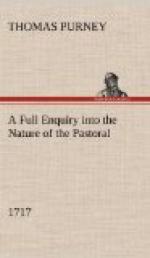There are three different Methods, (as we hinted in the first Chap. of the first Book) of describing the Country. For it may be drawn, as ’tis suppos’d to have been in the Golden-Age; or, as ’tis now, but only the pleasant and delightful Images extracted, and touch’d upon; or, lastly, we may draw the Country in it’s true and genuine Colours, the Deformities as well as the Beauties having admittance into our Poem.
This last sort run’s upon the Labours and fatigues of the Rusticks; and gives us direct Clowns and Country-Folk. We alway see ’em sweating with a Sicle in their Hands; beating their Cows from the Corn; or else at Scolding. Yet doubtless a kind of Pastorals of this Nature might be made extreamly delightful, if the Writer would dare to write himself, and not be lead so much by Theocritus and Virgil.
But a Method preferable to this, I think, is a Description of the Golden-Age; and there is very little difference between this, and that which we hold the best. It draw’s the Swains, all Innocent and tender. Show’s us Shepherds, who are so, not for their Poverty, but their Pleasure; or the Custom of those unrefin’d Ages, when the Sons and Daughters of Kings were of that Employ, as we read in the Scripture of the Ladies of greatest Quality, drawing Water for their Flocks, and the like. I am therefore nothing averse to this kind of Pastoral. It draw’s such a Life as we could easily wish our selves in; and such, and only such, can bear a pleasurable Description.
But all the Opportunities that the supposition of the Golden-Age gives the Reader of the Beautiful in his Descriptions, and being Entertaining in his Characters; In short, all the delightful Scenes, Arborets and Shades, as well as all the gentleness and simplicity of that Age, may be drawn into the other, namely the middle state, which we prefer; if the Characters be proper.
Besides, I should not be fond of describing the Golden-Age, because we are not so much interested and concern’d in what was only some thousand Years ago, and ne’re will be again. If the Poet possesses us with agreeable Sentiments of our own Country (by describing it, but omitting all that is not delightful in it) we are doubly pleas’d with the Consideration that it may be in our own Power to enjoy the sweet Amusement: and we are apt to fancy while we are reading, that were we among those Swains, we could solace our selves in their easy Retirements, and on their tender Banks in the same manner that they do.
And since Poetry, the more naturally it deceives, the more fully it pleases; I should be very desirous, methinks, of giving my Pieces as great an Appearance of Probability, as possible. And in our way, the Poet may, to add yet more to the Probability, mention several Places in the Country, which actually are to be found there; and will have several Opportunities of giving his Stories an Air of Truth.




